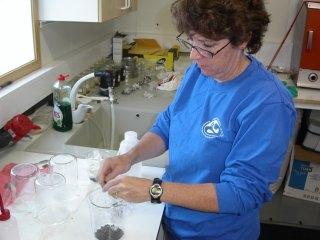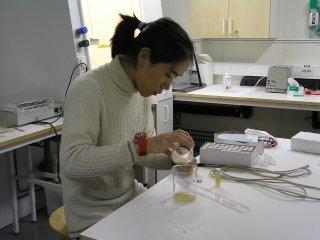25 August, 2004
Bits and Pieces From Aboard the Oden
As we await the next set of core samples here on Oden I spend a little time
with Erik visiting the Main Lab and talking to some of the
micropaleontologists. Itsuki Suto from the University of Tsukuba shares his
doctoral work on marine diatom resting spores. The parcticular diatoms he
works with are plant-like microorganisms that form long chains when nutrient
conditions are favorable. When conditions are poor they can form
thick-walled spores and go into a resting state. Itsuki shows me some of
these species that he has found in the sediments here on the Lomonosov
Ridge. In addition he shares his beautiful illustrations of these resting
spores with me. I promise to take the drawings back to my classroom and
display them for the students and other teachers to admire.
We also spend some time with Ted Moore from the University of Michigan. Ted
is parcticularly interested in radiolarians and fish teeth buried in the
sediments. To extract the teeth from the sediment is a fairly tedious
process; Erik and I give some assistance in processing these samples that
will later be analyzed onshore. The process requires taking small samples of
sediment of the same volume and manually breaking them into small pieces in
a large glass beaker. While some samples in the lab are treated with
chemicals to dissolve away carbonates and phosphates, these are not, so that
nothing of the fish teeth is destroyed. Some of the sediments are hard and
rock-like and very difficult to break; others are like modeling clay and
come off in small sticky pieces. After the pieces soak for some time in hot
water, we sieve them out until we are left with a very small quantity of
what looks like sand grains. These we store in very small glass vials and
set them aside to be brought back. They will be analyzed for the amount of
strontium isotopes among other things, from which scientists can determine
the age of the fossils.

I am preparing sediments to sieve for fish teeth.

Itsuki Suto at work in the Main Lab of the Oden.
Contact the TEA in the field at
.
If you cannot connect through your browser, copy the
TEA's e-mail address in the "To:" line of
your favorite e-mail package.
|
